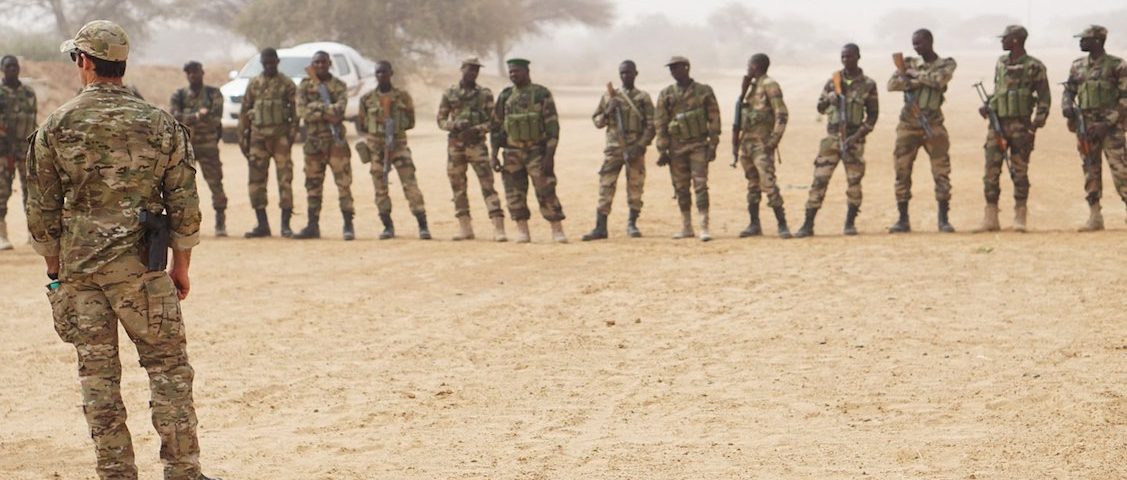by Mark P. Fancher, originally published on Black Agenda ReportFeb 21, 2018
Niger
Even though Donald Trump thinks Africa is a “shit hole” the continent forced its way into his life anyway in October when four U.S. soldiers were killed in Niger. After Trump deflected blame to others and made a soldier’s widow cry, he apparently returned quickly to his fantasies about boatloads of Norwegian immigrants swarming Ellis Island.
The military establishment was not so quick to change the subject. Their detailed investigation of the Niger matter has produced what is reported to be a damning assessment of the capacity of the U.S. military to carry out its imperialist agenda in Africa. The rest of us aren’t allowed to read it yet because, as the New York Times explained: “…public release has been delayed until General [Thomas] Waldhauser [head of U.S. Africa Command (AFRICOM)] appears before the Senate Armed Services Committee to present the command’s annual ‘posture hearing,’ scheduled for the last week of February.”
The New York Times goes on to say: “Defense officials said that the delay in part aims to keep senators from focusing on the Niger ambush during the hearing and, in turn, excoriating General Waldhauser when he testifies before the committee.” The convenient temporary suppression of the report will allow the General to present senators with the usual upbeat AFRICOM propaganda about U.S. soldiers digging wells and bringing medicine to downtrodden African villagers while giving friendly advice to African armies about how to fight terrorism.
Findings about failures of the campaign to militarize Africa are welcome news after the AFRICOM serpent has spent more than a decade slithering into almost every African country and establishing a venomous presence. Even better news is that the study reportedly “…calls for the Pentagon to scale back the number of ground missions in West Africa, and to strip commanders in the field of some authority to send troops on potentially high-risk patrols.”
With respect to the military deaths in Niger, the New York Times noted: “…[T]he ambush has exposed holes in the argument that the Pentagon has made under three different administrations: that in many far-flung places, American troops are not actually engaged in combat, but just there to train, advise and assist local troops.” Not only is the U.S. military engaged in combat, it has also formed an unholy alliance with France that gives both countries the opportunity to wreak havoc in Africa tag-team style. For example, in 2012 when one of Mali’s soldiers, who had been trained by AFRICOM, staged a coup that displaced Mali’s democratically elected government, the French military stepped in to try to clean up the mess.
France and the US in Africa
The U.S. has also had France’s back. State Department documents show that while Muammar Gadhafi lived, France coveted Libya’s oil and wanted desperately to stop plans to create a Pan-African currency backed by Libyan gold. In an effort to satisfy French desires, the U.S. stepped in and did the dirty work of arming vicious Libyan racists and terrorists who, in turn, not only committed a grisly assassination of Gadhafi, but also began a campaign of genocide against blacks in Libya.
In Niger, when French uranium mining operations in Arlit and a military installation in Agadez were attacked in 2013, the U.S. military stepped in, and its continuing involvement there eventually cost the lives of four U.S. soldiers last year. A Guardian article about the 2013 attacks said: “The militants vowed to hit any country that helped France…” Someone apparently made good on that threat.
The Failure of AFRICOM in Africa
Meanwhile, U.S. politicians claim they are clueless. Senator Lindsey Graham said: “I didn’t know there were 1,000 troops in Niger. This is an endless war without boundaries, no limitation on time or geography. We don’t know exactly where we’re at in the world militarily and what we’re doing.” Even though Donald Trump is probably less informed than Graham, his administration not only increased the number of drone strikes in Somalia, but also removed limits on drone strikes and commando raids that Barack (The King of Drones) Obama established in 2013.
Nevertheless, AFRICOM itself may already be downsizing. Lauren Ploch, a Congressional Research Service Africa analyst commented: “AFRICOM’s security cooperation spending was down in 2017 from the previous few years.” If the recently completed report on U.S. military engagement in Niger has the expected impact, the U.S. military presence in Africa will be scaled back even more — at least temporarily. But because the long-term interests of the U.S. Empire demand the continuing western capitalist domination of the African continent, the generals and strategists will no doubt huddle and figure out a more effective way to sell the AFRICOM idea, and it will return.
A temporarily scaled-back AFRICOM will present a window of opportunity that will probably close quickly. Those who want to prevent the further military domination of Africa must therefore make haste to do whatever possible to ensure that an already disintegrating AFRICOM project crumbles into dust and is swept away forever by African desert winds.
Mark P. Fancher is an attorney who writes frequently about the U.S. military presence in Africa. He can be contacted at mfancher(at)comcast.net
